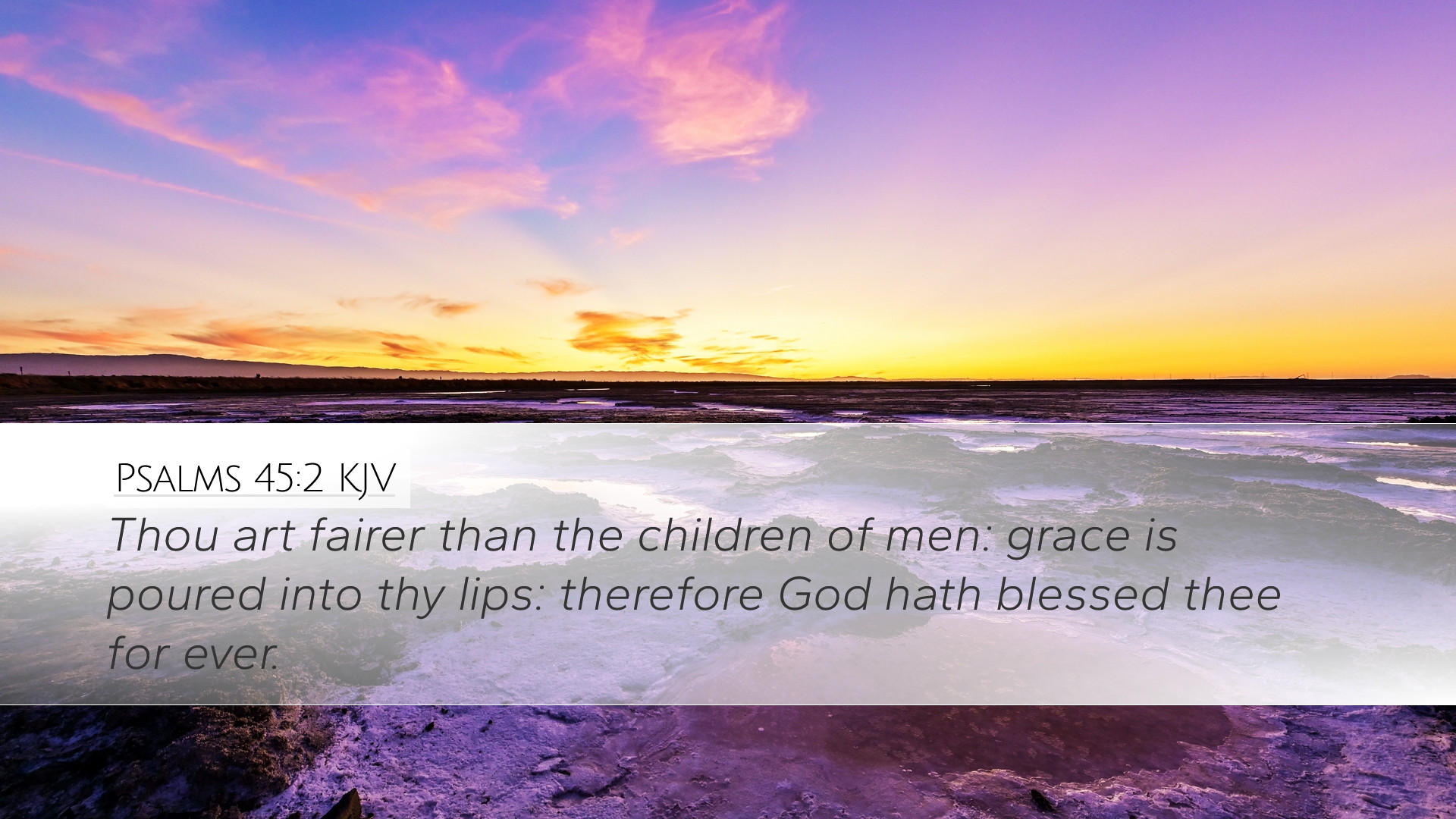Commentary on Psalms 45:2
Verse Text: "Thou art fairer than the children of men: grace is poured into thy lips: therefore God hath blessed thee for ever."
Exegesis and Overview
The verse Psalms 45:2 presents a profound declaration that speaks to the beauty and grace of the subject of the psalm, traditionally interpreted as the king or a messianic figure. This exploration reveals insights pertinent to both the context in which the psalm was written and its theological implications for contemporary understanding.
Beauty Beyond Comparison
Matthew Henry notes that when it states, "Thou art fairer than the children of men," it emphasizes the extraordinary beauty of the subject. This beauty may not just refer to physical appearance but encompasses moral and spiritual dimensions. The psalmist positions the subject as a figure of divine favor and an ideal beyond worldly standards of beauty.
Albert Barnes elaborates further, asserting that the comparison points to an appeal to the inner beauty of holiness and virtue. The king, or messianic figure, is distinguished by qualities that elevate him above others. In this light, beauty signifies more than aesthetics; it embodies character and righteousness, areas critical for leaders and servants of God.
Grace Poured Out
The phrase, "grace is poured into thy lips," can be contemplated in various ways. According to Adam Clarke, this implies that the speech of the individual possesses a divine quality. The elegance and wisdom of the words signify a divinely endowed authority, a characteristic that prepares the leader or the Messiah to teach and guide his people effectively.
This notion of grace implies not only an endowment of eloquence but also a message filled with content that inspires, uplifts, and convicts. The idea of grace being 'poured' suggests an overflowing abundance, indicating that the words spoken carry the weight of divine truth, meant to draw the listener toward wisdom and understanding.
Divine Blessing
The conclusion of the verse, "therefore God hath blessed thee for ever," is of paramount significance. Both Barnes and Henry remark that the blessing of God reflects a formal acknowledgment of the figure's worthiness in leadership and his covenant standing before God. It indicates an eternal favor, suggesting that the divine relationship endures beyond temporal circumstances.
Furthermore, it implies that the blessings attached to this figure are not transient; rather, they encompass both the present and the future. The continuity of God’s blessings symbolizes a hope that transcends time and speaks to God’s promises, which find their ultimate fulfillment in Christ — a core theological tenet echoed across Christian doctrine.
Theological Implications
By understanding Psalms 45:2 in its totality, one perceives a foreshadowing of Christ, portrayed not just as a historical figure, but as the embodiment of divine grace and beauty. The implications for Christian theology are immense, as the fulfillment of this psalm in Christ serves both as affirmation of His divine nature and His role as the ultimate prophet, king, and priest.
For pastors and theologians, this verse provides rich material for understanding the nature of Christ as one who embodies all that is good, beautiful, and true. The grace poured into His lips resonates with the importance of speaking truth in love, a vital tenet for Christian ministry.
Application in Ministry and Life
Pastors can use this verse as a basis for teaching about the qualities of leadership that reflect God's character. In sermons, the focus can shift to the importance of grace-filled communication and the pursuit of holiness that marks a leader's effectiveness. The attractiveness of one's character, infused with Christ-like grace, serves as a powerful witness to those seeking truth.
Students and scholars might further explore the historical context of the psalm, applying its lessons to discussions on how divine beauty and grace manifest in today's world. The principles underlying the psalm remind believers of the attributes they are called to cultivate in their lives and ministries. By imitating the beauty and grace described in this verse, Christians are invited to participate in a transformative journey toward Christ-likeness.
Conclusion
In summary, Psalms 45:2 serves as a rich text that elucidates the divine beauty, grace, and blessings associated with God's anointed. The insights from public domain commentaries furnish a multidimensional understanding that invites deeper reflection and application in the lives of believers. The notion of a leader reflecting divine attributes finds relevance in all walks of life, encouraging a pursuit of beauty, grace, and blessing that remains centered on God's eternal Word.


